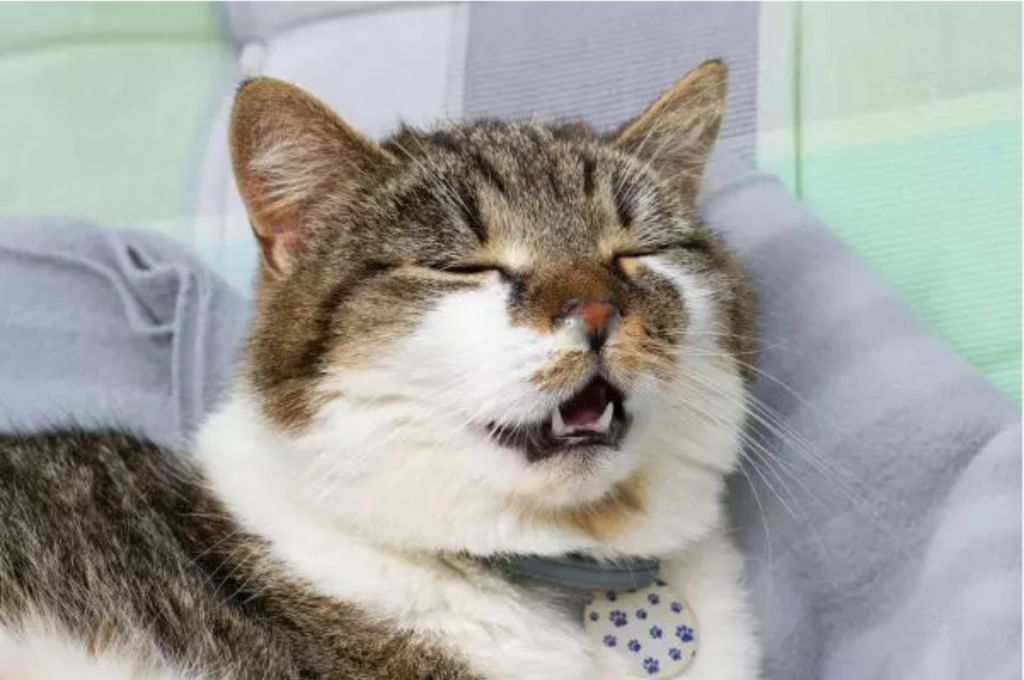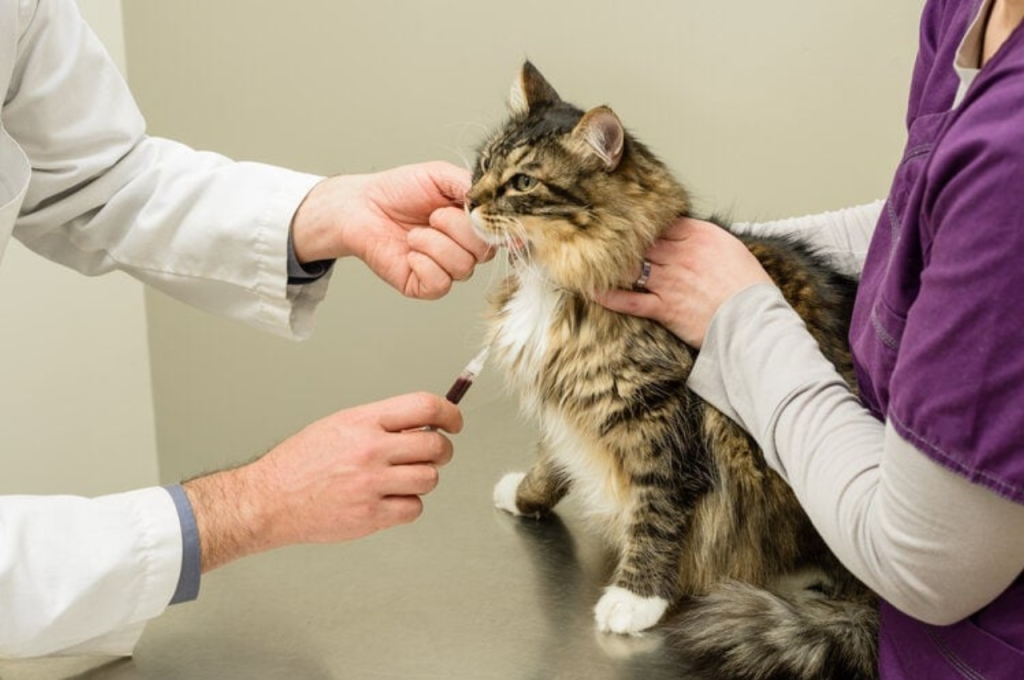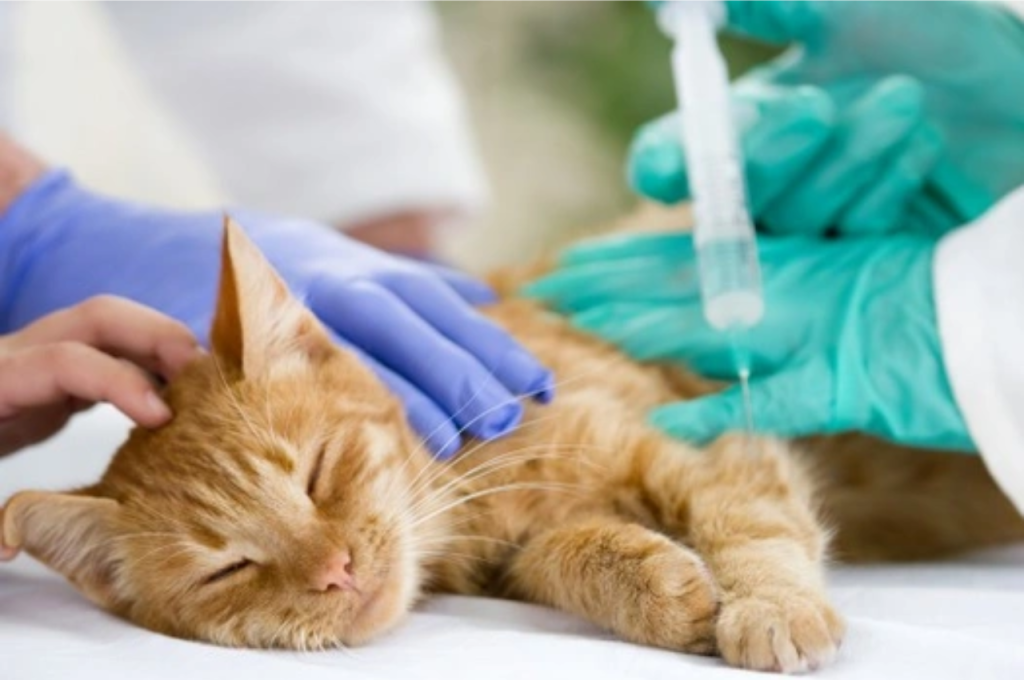If your cat is sneezing frequently, it may be due to respiratory infections, allergies, or irritants in its environment. We will explore the possible causes of your cat’s sneezing and provide tips on how to treat or prevent it from happening.
Sneezing is a natural reflex that helps cats get rid of irritants and foreign objects in their noses. Although occasional sneezing is not a cause for concern, frequent sneezing can be a sign of an underlying health issue. Respiratory infections, such as feline herpesvirus and calicivirus, are common causes of sneezing in cats.
Allergies to dust, pollen, and other allergens can also trigger sneezing. Additionally, irritants like cigarette smoke and air fresheners may cause your cat to sneeze. In the following sections, we will discuss these causes in more detail and provide advice on how to alleviate your cat’s sneezing.
Common Causes of Sneezing in Cats
There are various reasons why your cat might be sneezing, including respiratory infections, allergies, irritants, and foreign bodies caught in their nose. It is important to keep an eye on their symptoms and seek veterinary attention if necessary to ensure your cat remains healthy.

Cats are quite prone to sneezing and it is usually not a big deal. However, persistent or chronic sneezing can be a sign of an underlying health issue. Below are some of the common causes of sneezing in cats:
Allergies
Cats can develop allergies, just like humans. Allergies can be caused by a variety of things such as food, environmental factors, or fleas. When a cat is exposed to an allergen, their body produces histamines, causing sneezing, itching, and other symptoms. To find out what your cat is allergic to, a vet may perform an allergy test.
Upper Respiratory Infections
Upper respiratory infections are quite common in cats, especially those who live with other cats. A viral infection can cause sneezing, runny nose, and watery eyes. Bacterial infections can also cause similar symptoms. The good news is that with proper treatment, cats can recover from an upper respiratory infection within 1-2 weeks.
Foreign Body
Cats are curious creatures and may inhale foreign objects. This can cause sneezing, coughing, and, if left untreated, can lead to more serious problems. A vet may perform tests or x-rays to determine if there is a foreign body causing your cat to sneeze.
Nasal Polyps
Nasal polyps are a growth in the nasal cavity that can cause sneezing, nasal discharge, and breathing difficulties. They are more common in older cats and can be treated with surgery.
Dental Problems
Believe it or not, dental problems can cause a cat to sneeze. A tooth root abscess can cause sinusitis, leading to sneezing, nasal discharge, and even nosebleeds. Regular dental check-ups can help prevent tooth root abscesses.
Cancer
While rare, cancer can also be a cause of sneezing in cats. Tumors in the nasal cavity can cause sneezing and nasal discharge. If you notice any other symptoms or changes in your cat’s behavior, it’s best to take them to the vet for an evaluation.
Uncommon Causes of Sneezing in Cats
Sneezing in cats can be caused by many factors, including allergens, infections, and irritants. However, there are uncommon causes of sneezing in cats, like foreign objects stuck in their nose and dental disease. To prevent serious health issues, it’s essential to consult with a veterinarian when your cat is experiencing constant sneezing.
Sneezing is a normal reflex that helps your feline friend get rid of irritants and secretions from their airways. However, sneezing can also be a symptom of an underlying health issue. While the common causes of sneezing in cats include allergic reactions, respiratory infections, and irritants like dust or smoke, some uncommon factors can cause sneezing in cats. These are the causes that are often overlooked by cat owners. Early detection and treatment of these uncommon causes of sneezing can help keep your furry friend healthy and happy. Here are some of the uncommon causes of sneezing in cats and how to recognize them.
Foreign Bodies
Cats are curious creatures, and they love to explore their surroundings. Sometimes, cats may inhale or sniff foreign bodies, which can cause sneezing. Signs of a foreign body in your cat’s nostrils include sneezing, pawing at the nose, and discharge from the nostrils. If you suspect that your cat has inhaled a foreign object, such as a blade of grass or a piece of plastic, take them to the vet immediately. Your vet may perform an x-ray or use an endoscope to remove the foreign object.
Dental Problems
Dental problems are another uncommon cause of sneezing in cats. Teeth and gum diseases in cats can cause infections that spread to the nasal passages, leading to sneezing. Signs of dental problems in cats include bad breath, tooth loss, and bleeding from the gums. If your cat has dental problems, they may need to have their teeth cleaned or removed. Your vet may also prescribe antibiotics to treat the infection.
Diagnosis of Sneezing in Cats
Sneezing in cats can be caused by a variety of factors such as allergies, infections, and irritants. To diagnose the root cause, a veterinarian may need to perform a physical exam, conduct blood tests or radiography, and take a nasal discharge sample for analysis.
Cats are adorable creatures, and it’s natural to worry when they show signs of being ill. If your cat is sneezing frequently, it may be a sign of an underlying health issue that needs attention from a veterinarian. A veterinary examination and diagnostic tests can help determine the cause of your cat’s sneezing.
Veterinary Examination
When it comes to diagnosing your cat’s sneezing, your veterinarian will physically examine your cat and try to identify any physical changes or abnormalities. The examination will include a thorough check of your cat’s respiratory system, including the nose and throat. Your veterinarian will also ask about the duration of the sneezing, any other symptoms, and your cat’s medical history.
Diagnostic Tests
Diagnostic tests are essential for the accurate diagnosis of the cause of your cat’s sneezing. These tests may include blood tests, bacterial or fungal cultures, and X-rays. Your veterinarian may also perform an ultrasound or other imaging tests if they suspect a more severe issue.

Blood Tests
Blood tests can help diagnose infections, immune system disorders, or other systemic issues that could be causing your cat’s sneezing.
Bacterial or Fungal Cultures
If your veterinarian suspects that your cat has a respiratory infection, they may need to take a bacterial or fungal culture. These tests will help determine the specific bacteria or fungus causing the infection, allowing your veterinarian to prescribe the appropriate treatment.
X-rays and Imaging Tests
If your veterinarian suspects that your cat has a nasal tumor or other respiratory issues, they may need to perform X-rays or other imaging tests. These tests can help determine the location and severity of any abnormalities.
Treatment Options for Sneezing in Cats
Sneezing in cats can be caused by various reasons including allergies, infections, or irritants. Treatment options include antihistamines, nasal decongestants, antibiotics, and natural remedies such as steam therapy and vitamins. Consulting a vet is advisable for a proper diagnosis and treatment plan.
If you notice that your cat is sneezing frequently, it may be an indication of an underlying health issue. In some cases, the sneezing may stop without treatment. But if it persists, you should take your cat to the veterinarian to determine the cause of the issue. The treatment will depend on the underlying cause of the sneezing. Here are some of the treatment options that your veterinarian may consider:
Antibiotics
In some cases, the sneezing in cats may be caused by a bacterial infection. In such cases, the veterinarian may prescribe antibiotics to address the issue. The antibiotics will help to eradicate the bacteria and alleviate the symptoms of the infection. It is important to note that antibiotics should only be administered under the guidance of a veterinarian, as inappropriate use may lead to antibiotic resistance.
Antifungal Medications
If your veterinarian determines that the cat’s sneezing is caused by a fungal infection, they may prescribe antifungal medications. These medications may be administered orally or topically depending on the severity of the infection. The antifungal medications work by destroying the fungi that are causing the infection and alleviating the symptoms of the condition. It is essential to consult the veterinarian if you notice that your cat is sneezing frequently.
The veterinarian will perform a physical examination and potentially imaging tests to determine the underlying cause of the sneezing. Once the diagnosis is confirmed, the appropriate treatment plan will be put in place. Following the veterinarian’s recommendations will help to ensure that your cat recovers from the underlying cause of the sneezing.
Prevention of Sneezing in Cats
Sneezing in cats can be caused by a variety of reasons, such as allergies, viruses, and bacterial infections. Keeping your cat’s vaccinations up-to-date and regularly cleaning their litter box can help prevent sneezing. It’s important to consult a veterinarian if your cat’s sneezing persists or is accompanied by other symptoms.
Cats are adorable furry friends that can bring joy and happiness to anyone. However, just like humans, they can have health issues too, including sneezing. Sneezing in cats can be caused by several reasons, including allergies, infections, and other health problems. Fortunately, there are ways to prevent sneezing in cats. In this article, we will discuss some measures that can help you prevent your cat from sneezing.
Environmental Changes
Environmental changes can play a significant role in your cat’s health. As a cat owner, you must ensure that your cat’s environment is clean and free of irritants that can trigger sneezing. Here are some ways to prevent environmental factors from causing sneezes:
- Regularly clean your cat’s litter box
- Wash your cat’s bedding frequently
- Avoid using harsh chemicals to clean your home, especially the area where your cat spends most of its time
- Use air purifiers or filters to remove allergens and dust from the air
Vaccinations
Vaccinations are an essential part of your cat’s health routine. They can help prevent infections that can lead to sneezing and other health issues. Vaccines work by preparing your cat’s immune system to fight off infections before they even occur. Some of the vaccines that can help prevent sneezing in cats are:
| Vaccine | Prevents |
| Feline herpesvirus vaccine | Viral respiratory infections, including sneezing |
| Feline calicivirus vaccine | Respiratory infections, including sneezing |
| Feline immunodeficiency virus vaccine | Immune system deficiencies can make cats more susceptible to infections that cause sneezing |
It’s best to consult your veterinarian to determine which vaccines your cat needs and when they should receive them. By making environmental changes and ensuring your cat receives the necessary vaccinations, you can help prevent sneezing in your furry friend. In case your cat already shows symptoms of sneezing, it is best to consult a veterinarian to determine the underlying cause and receive proper treatment.
When to Seek Emergency Medical Attention
If your cat is sneezing excessively, especially with discharge from the nose or eyes, it may be a sign of an infection or allergy. If your cat is also experiencing difficulty breathing or has a high fever, it is important to seek emergency medical attention from a veterinarian as soon as possible.

Cats can sneeze for some reasons, from allergies to respiratory infections. While sneezing is typically not a cause for concern, there are instances when your cat may need emergency medical attention. It is important to be able to recognize these situations to ensure your furry friend receives prompt care.
Difficulty Breathing
If your cat is sneezing excessively and having trouble breathing, it could be a sign of a respiratory emergency that requires immediate attention. Difficulty breathing can be accompanied by wheezing, coughing, and other respiratory symptoms. In this situation, it is important to remain calm and take your cat to the veterinarian or emergency animal hospital right away.
Dehydration
Excessive sneezing can lead to dehydration, especially if your cat is not drinking water or eating normally. Signs of dehydration include lethargy, dry mouth and nose, sunken eyes, and loss of skin elasticity. If you notice any of these symptoms, it is important to seek veterinary attention as soon as possible. Dehydration can be life-threatening if left untreated.
Conclusion
Cats can sneeze for a variety of reasons, ranging from minor irritations to more serious health issues. Cat owners need to observe their pets and look for accompanying symptoms to determine the cause and seek appropriate treatment. With some understanding and attention, cat sneezing can be managed and treated to keep your furry friend happy and healthy.
So stay vigilant and keep your cat’s health in check to ensure their well-being.
